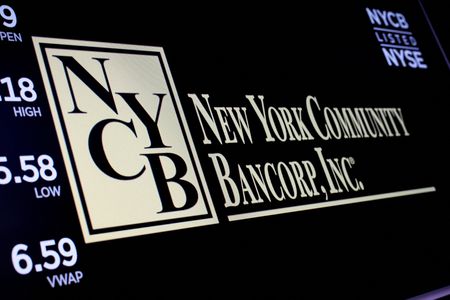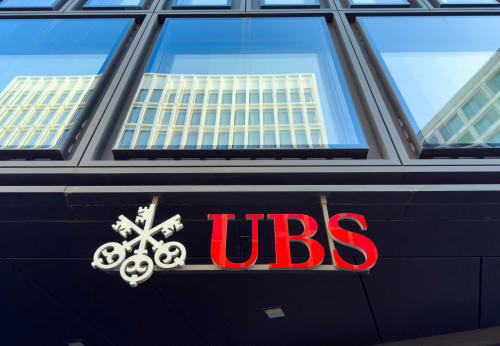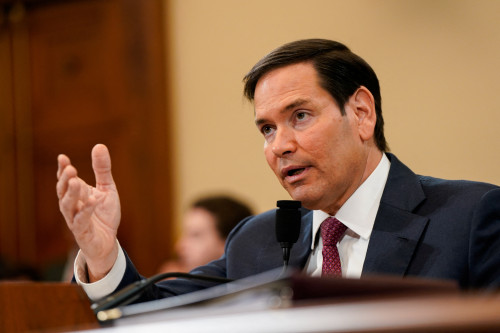
A trader works at the post where New York Community Bancorp stock is traded on the floor at the NYSE in New York
By Niket Nishant and Lewis Krauskopf
(Reuters) -Shares of New York Community Bancorp closed higher on Wednesday after the lender sought to bolster investor confidence by appointing a new executive chairman and said it could cut exposure to the troubled commercial real estate (CRE) segment.
The bank’s shares gained 6.7% on the day, rebounding after they had fallen more than 14% earlier in the session.
NYCB shares are still down more than 50% since last week after it posted a surprise quarterly loss due to huge provisions for loans tied to the CRE industry and cut its dividend to deal with tough regulation.
Banking veteran Alessandro DiNello, who was appointed executive chairman on Wednesday and has been on the board since NYCB bought Flagstar Bank in 2022, said the lender will, if needed, shrink its balance sheet by selling non-core assets to increase common equity tier 1 ratio, a key measure of financial strength.
DiNello also said the bank will consider the sale of loans in its CRE portfolio or allow them to run off the balance sheet naturally.
“The challenge today is not easy. But this company has a strong foundation, strong liquidity and a strong deposit base, which gives me confidence for our path forward,” DiNello said on a Wednesday call with analysts.
Higher borrowing costs and low occupancies due to remote working have pressured CRE borrowers, who are now at risk of defaults, analysts have warned. Federal Reserve Chairman Jerome Powell last week shot down hopes of a March interest rate cut, saying policymakers needed to see more evidence that inflation was cooling.
Still, some analysts were encouraged by recent comments from NYCB.
“We believe that management’s update should potentially blunt some of the negativity impacting the stock and could drive a short squeeze,” said Ebrahim Poonawala, a banking analyst at BofA Securities, in a note.
A short squeeze occurs when a rising share prices forces bearish investors to unwind their bets, sending the stock higher. Ihor Dusaniwsky, managing director of predictive analytics at S3 Partners, which tracks short activity, said there was little evidence such a phenomenon occurred on Wednesday.
Short investors in NYCB’s shares are up $162.3 million in mark-to-market profits since Jan. 30, the firm said.
Other analysts were encouraged by a rise in NYCB’s deposits since the beginning of the year.
The bank said its total deposits had risen to about $83 billion on Tuesday, up from $81.4 billion at the end of 2023. Total liquidity of $37.3 billion also exceeds uninsured deposits.
Alexander Yokum, senior equity analyst at CFRA Research, viewed the rise in deposits as a positive. Last year, when shares of struggling regional banks tumbled, those banks’ deposits also fell, Yokum said.
“The fact that that has not occurred so far at least… provided a little bit of relief,” Yokum said. “It’s still going to be a difficult road, but I think the deposit update did relieve some strain.”
NYCB is seeking to sell part of its loan book and also bring in investors that would assume part of its residential mortgage credit risk, a person familiar with the matter said. Bloomberg reported the company’s efforts to do so earlier on Wednesday.
CREDIT RATING CUT
On Tuesday, Moody’s cut the bank’s credit rating to junk and warned of more downgrades, saying NYCB faces high governance risks from its transition with regards to the leadership of its second and third lines of defense, the risk and audit functions.
NYCB CEO Thomas Cangemi said Moody’s downgrade was not expected to have a material impact on its contractual arrangements.
“Despite the Moody’s ratings downgrade, our deposit ratings from Moody’s, Fitch and DBRS remain investment grade,” he said.
Deposit ratings measure a bank’s ability to meet its deposit obligations and are different from credit ratings, which gauge its ability to repay debt.
The bank’s shares, which earlier in the session plumbed lows not seen since 1997, closed at $4.48.
Evidence of further trouble in the commercial real estate sector came as shares of KKR Real Estate Finance Trust fell 20% to $9.42, their lowest since March 2020, after the company slashed its dividend. The shares were recently at $9.98.
The KBW Regional Banking index edged down 0.14% on the day.
There was little sign, however, that worries over the banking sector had seeped into the broader market. The S&P 500 closed up 0.8% at a record high.
Last year’s regional banking crisis “was bad” but “it proved not to spread. And this even seems to me to be more so very specific about one bank,” said Eric Kuby, chief investment officer at North Star Investment Management Corp.
(Reporting by Niket Nishant in Bengaluru; Additional reporting by David French, Lewis Krauskopf, Davide Barbuscia and Saqib Iqbal Ahmed; Editing by Ira Iosebashvili, Alexandra Hudson, Nick Zieminski and Jamie Freed)






